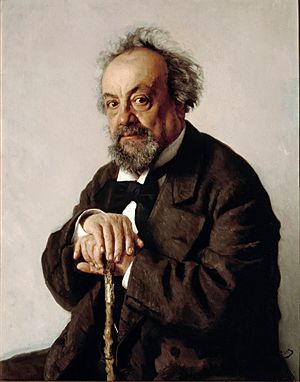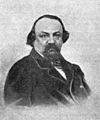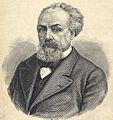Aleksey Pisemsky facts for kids
Quick facts for kids
Aleksey Pisemsky
|
|
|---|---|

Portrait of Pisemsky by Ilya Repin
|
|
| Born | 23 March 1821 Kostroma Governorate, Russian Empire |
| Died | 2 February 1881 (aged 59) Moscow, Russian Empire |
| Occupation | Novelist • Playwright |
| Genre | Novel, short story |
| Literary movement | Realism |
| Notable works | One Thousand Souls (1858) A Bitter Fate (1859) An Old Man's Sin (1862) Troubled Seas (1863) |
| Notable awards | Uvarov Prize of the Russian Academy |
| Spouse | Yekaterina Pavlovna Svinyina |
| Children | 2 |
| Signature | |
Aleksey Feofilaktovich Pisemsky (Russian: Алексе́й Феофила́ктович Пи́семский) (March 23, 1821 – February 2, 1881) was a famous Russian writer. He wrote novels and plays. In the late 1850s, many people thought he was as good as other great writers like Ivan Turgenev and Fyodor Dostoyevsky.
Pisemsky was one of the first playwrights in Russian theater to write about ordinary people. He helped create a style called Realism, which means showing life as it really is. A famous critic, D.S. Mirsky, said Pisemsky had a "great narrative gift" and was "one of the best Russian novelists."
His first novel, Boyarschina (written in 1847, published in 1858), was initially not allowed to be printed because it showed the Russian noble class in a critical way. Some of his most important novels include The Simpleton (1850) and One Thousand Souls (1858), which many consider his best novel. Troubled Seas (1863) showed what Russian society was like around 1862.
Pisemsky also wrote plays. His play A Bitter Fate (1859) showed the difficult lives of Russian peasants. This play is often called the first Russian realistic tragedy. It even won a special award called the Uvarov Prize.
Aleksey Pisemsky's Life Story
Early Years and Family
Aleksey Pisemsky was born on his father's estate called Ramenye, in a region of Russia called Kostroma. His parents were Feofilakt Gavrilovich Pisemsky, a retired army colonel, and Yevdokiya Shipova. Aleksey was their only child to survive, as many of his brothers and sisters died young.
He described himself as a weak and sometimes difficult boy. He also used to walk in his sleep. Pisemsky remembered his father as a strict and honest military man. His father was fair to hard-working people but tough on those who were lazy.
His mother was a thoughtful and sociable woman. She was not formally educated but was very clever. Pisemsky wrote that she became more beautiful with age because of her "inner beauty." His mother's cousins, Yury and Vsevolod Bartenev, were important figures in his early life. Vsevolod, a Navy officer, especially encouraged Aleksey to read and learn music.
Pisemsky spent his first ten years in the town of Vetluga, where his father was the Mayor. Later, they moved to the countryside. He loved hunting and riding horses. His early education was simple, with tutors who taught him reading, writing, math, Russian, and Latin.
He loved to read and by age 14, he had read many famous books like those by Walter Scott and Don Quixote. He didn't like children's books, thinking they were silly. He later regretted not learning more languages, but he found he was naturally good at math, logic, and art.
School and Acting
In 1834, at age 14, Pisemsky went to a school called a gymnasium in Kostroma. He was a good student and popular for his acting. He was inspired by an opera and started a home theater with his roommate. He had great success in his first role. This made him very interested in art and theater.
His uncle, Vsevolod Bartenev, helped him by providing new novels and magazines. Pisemsky also started to learn music and play the piano.
Pisemsky began writing while in school. He wrote two novellas, The Circassian Girl and The Iron Ring. He sent The Iron Ring to magazines in Saint Petersburg, but it was rejected. Later, a university professor told him to write about things he knew more about.
In 1840, Pisemsky went to Moscow State University to study mathematics. He chose this path even though his father wanted him to go to a different school closer to home. He felt his choice of university was good, even if he didn't use much of the math directly. He read many classic authors like Shakespeare, Schiller, and Voltaire, which helped him understand Russian literature better.
Talented Performer
By 1844, Pisemsky was known for his amazing ability to read aloud. He often performed works by Nikolai Gogol. His performances were very popular among students. He was especially good as a character named Podkolyosin in Gogol's play Marriage. Some people even thought he was better than the famous actor Mikhail Shchepkin in that role.
He became so well-known for his readings that he received invitations to perform in other cities. He was also very good at telling stories from his own life, often making them funny. Many of these stories later appeared in his books.
Working for the Government
After finishing university in 1844, Pisemsky started working for the government in Kostroma. He then moved to a similar job in Moscow. In 1846, he left his job for two years.
In 1848, he married Ekaterina Svinyina and returned to government work in Kostroma. He worked in various government roles until 1872, when he finally left public service. His time working in different parts of Russia greatly influenced his writing.
One friend noted that Pisemsky took his government work seriously. He tried to fight against problems like dishonesty and unfairness. This experience helped him understand Russian life and people very deeply.
A critic named Alexander Skabichevsky saw similarities between Pisemsky and another writer, Saltykov-Schedrin. Both wrote about the challenges of life in the provinces, where there were many problems. Pisemsky's experiences made him feel that some of the grand ideas he learned at university didn't quite fit with real Russian life.
Writing Career Begins
Pisemsky's first novella, Is She to Blame?, was written while he was still a student. It was published in a magazine in 1848, but it was changed a lot by the editor.
His first novel, Boyarschina, was written in 1845. It was not allowed to be published until 1858 because it was seen as too critical of society. However, it already showed his unique writing style: very realistic, lively, and often humorous, but also showing the difficult parts of life.
Joining Moskvityanin Magazine
In 1850, Pisemsky was invited to write for a magazine called Moskvityanin. He sent them his second novel, The Simpleton, which was published in 1850. This story was about a young idealist whose dreams are shattered. It was very popular and praised by critics.
A year later, his story Marriage of Passion also appeared in the same magazine and was well-received. People started to compare Pisemsky to other leading writers of the time.
His first play, The Hypochondriac (1852), was followed by a series of short stories about peasant life. In his early works, Pisemsky often showed a critical view of people, believing that many were driven by selfish interests. He felt that people often acted badly, and that one should always be careful around others.
He often showed educated people with progressive ideas as being worse than uneducated people. Some critics found this view unusual, but it came from his deep observations of life in the Russian provinces.
Working with Sovremennik
Pisemsky became very active in writing during the early 1850s. Many of his works appeared in different journals. In 1854, he moved to Saint Petersburg. He made a strong impression with his unique style and his honest, sometimes shocking, opinions.
He was seen by some as a simple man from the countryside, but this did not stop him from becoming a very successful writer. By the late 1850s, his reputation was at its highest.
In Saint Petersburg, Pisemsky became friends with Ivan Panaev, an editor of Sovremennik magazine. Pisemsky sent his novel The Rich Fiancé to them. This novel made fun of certain types of intellectuals. Pisemsky felt comfortable working with Sovremennik because he was not strongly tied to any political group.
Despite his growing popularity, Pisemsky was not financially stable. He often criticized editors for not paying writers enough. He remained relatively poor until 1861, when a publisher bought the rights to all his works for a large sum of money.
In 1856, Pisemsky was asked by the Russian Navy to report on the people and trade in the Astrakhan and Caspian Sea regions. He wrote some stories based on this trip, which were later collected in a book called Traveller's Sketches.
His short stories from the late 1850s and early 1860s, which focused on rural life, continued to show his critical view of society. He did not idealize peasants, nor did he criticize them too harshly. He was also somewhat critical of the 1861 reform that freed the serfs, believing that without strong moral guidance, people might not overcome their old problems.
Leading Biblioteka Dlya Chteniya
In the mid-1850s, Pisemsky's relationship with Sovremennik magazine became difficult. He was not interested in their political views, and they kept a distance from him. He sent his novel One Thousand Souls to another magazine, Otechestvennye Zapiski, where it was published in 1858. This novel painted a detailed picture of provincial life, showing its problems.
The editor of Biblioteka Dlya Chtenya magazine, Alexander Druzhinin, invited Pisemsky to be a co-editor. From 1858 to 1864, Pisemsky was the main leader of the magazine.
His play A Bitter Fate (1859) was another big success. It was based on a real-life event Pisemsky investigated. This play became a classic of Russian drama and won an award. In 1861, his short novel An Old Man's Sin was published. It is considered one of his most gentle and emotional works.
By the mid-1850s, Pisemsky was seen as one of the most important writers of his time. However, his reputation later declined. One reason was that his critical views, which were unique earlier, became controversial. He also found himself in opposition to the new, more radical ideas of the time.
Biblioteka Dlya Chtenya started publishing humorous pieces, and Pisemsky wrote some of them, making fun of liberal ideas. This led to a public argument with another magazine, Iskra, which called him "dumb and ignorant." This argument became very heated, with challenges to a duel and public letters of protest.
Moving to Moscow
The public argument had a very negative effect on Pisemsky. He became very sad and decided to leave Saint Petersburg. At the end of 1862, he moved to Moscow, where he lived for the rest of his life.
In Moscow, he worked hard on his novel Troubled Seas. He had traveled abroad and met Russian people living outside Russia, which gave him ideas for the book. The novel showed Russian society in a very negative light, describing it as a "sea of grief." It also showed political radicals in an unfavorable way. Because of this, the novel received many negative reviews.
Later Life and Challenges
After moving to Moscow, Pisemsky became the head of the literary department at The Russian Messenger magazine. In 1866, he also became a government councilor, which gave him financial stability. He was a careful spender and eventually earned enough money to leave both his magazine and government jobs. He even bought land and built a house in Moscow.
However, his later works, like Troubled Seas (1863) and Russian Liars (1864), were his last to be widely praised. After 1864, critics felt his writing became weaker. He wrote plays that criticized financial dishonesty and corruption. Some of these plays were banned, and others had short-lived success because people recognized real-life figures in them.
In his later years, Pisemsky wrote two more novels, The Philistines and Masons. Critics found these works less engaging. Even Ivan Turgenev, who tried to support Pisemsky, noticed a "tiredness" in his writing. Pisemsky himself admitted he was tired of writing and living, suffering from deep sadness.
Losing his popularity was a major reason for his unhappiness. He knew his best days as a writer were behind him. He found some comfort in his religious beliefs during these difficult times.
Ivan Turgenev was a constant source of support. In 1869, Turgenev told him that One Thousand Souls had been translated into German and was very successful, making Pisemsky known in Europe.
Another happy event was the celebration of his 25th anniversary as a writer on January 19, 1875. Pisemsky said that he always tried to be truthful in his writing and tell his country the truth about itself.
In the late 1870s, Pisemsky's younger son, Nikolai, who was a talented mathematician, died. This was a terrible blow to Pisemsky, causing him deep sadness. In 1880, his second son, Pavel, became very ill and died. This final tragedy completely broke Pisemsky's spirit.
Aleksey Pisemsky died on January 21, 1881, just a week before Fyodor Dostoyevsky. While Dostoyevsky's funeral was a huge public event, Pisemsky's burial was quiet, with only a few well-known authors attending, including Alexander Ostrovsky. His personal writings were later destroyed in a fire, and his house was torn down. However, a street in Moscow was named Pisemsky Street in his honor.
Private Life
Pisemsky married Yekaterina Pavlovna Svinyina on October 11, 1848. She was the daughter of Pavel Svinyin, who started the Otechestvennye Zapiski magazine. Their marriage was not based on strong romantic feelings, but it was a very good one for Pisemsky.
Many people who knew her said Yekaterina was a wonderful person. She helped calm his sadness and took care of all household duties, including raising their children. She also re-wrote most of his original manuscripts, which were often messy and hard to read.
A biographer called her "a perfect literary wife" who cared deeply about her husband's writing and helped him in every way she could. Ivan Turgenev once told Pisemsky that he had won a "major prize" in life by having such an excellent wife and good children.
Personality
People who knew Pisemsky remembered him as a kind person whose good qualities outweighed his weaknesses. He was known for his strong sense of justice, good humor, honesty, and modesty.
One critic said that Pisemsky's personality, from his simple nature to his sharp observations and common sense, was like that of a very clever Russian peasant. His most important personal trait was his truthfulness and honesty, which became a great strength in his writing. He always aimed to write what he truly felt and thought.
Legacy
Critics have had different opinions about Pisemsky's place in Russian literature over time. For a while in the 1850s, he was considered a top writer, even called an "heir to Gogol." But then his popularity declined, and he was almost forgotten for decades.
Pisemsky started writing when the "Natural School" of writing was popular, which focused on realistic details of everyday life. He is seen as one of its most important supporters. He showed the world of small-town Russia without any romantic ideas. He "mercilessly destroyed the poetic aura" of noble estates, showing a world where relationships were often difficult and true love struggled against deceit.
He was also very skilled at showing Russian peasants and capturing their way of speaking. After him, it was hard for writers to go back to the older, more idealized ways of writing about peasants. D. S. Mirsky noted that Pisemsky's writing was often serious, but in a different way than Turgenev's. Pisemsky's seriousness came from a strong dislike for the bad parts of humanity and the uselessness of some educated Russians.
Some critics believe that Pisemsky's main driving force was his critical view of society, which became less effective by the early 1860s. While he might be seen as a less central figure in Russian novels, his short stories are considered very important. He is seen as a predecessor to great short story writers like Leskov and Chekhov.
Selected works
Novels and novellas
|
Plays
|
English translations
- The Old Proprietress, (story), from Anthology of Russian Literature, Vol 2, G. P. Putnam's Sons, 1903.
- One Thousand Souls, (novel), Grove Press, NY, 1959 (translated by Ivy Litvinov).
- A Bitter Fate, (play), from Masterpieces of the Russian Drama, Vol 1, Dover Publications, NY, 1961.
- Nina, The Comic Actor, and An Old Man's Sin, (short novels), Ardis Publishers, 1988. ISBN: 0-88233-986-9
- The Simpleton, (novel), Foreign Languages Publishing House, Moscow.
Images for kids
-
Portrait of Pisemsky by Sergei Levitsky, 1856.
See also
 In Spanish: Alekséi Písemski para niños
In Spanish: Alekséi Písemski para niños
 | Jackie Robinson |
 | Jack Johnson |
 | Althea Gibson |
 | Arthur Ashe |
 | Muhammad Ali |







